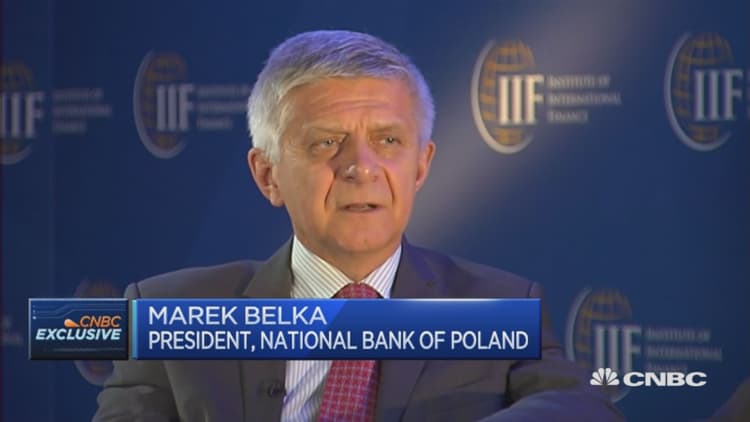Rising aversion in Poland towards the European Union is worrying, the country's outgoing central bank governor told CNBC, at a time when Euroskepticism appears to be rising across the region.
Poland is a member of the 28-country EU, with which Poland's ruling Euroskeptic Law and Justice Party has clashed since taking power in October. The Polish government has increased its power over domestic institutions and the EU is investigating whether its changes to the Polish constitutional court undermine the rule of law.
The highly conservative party has also removed the EU flag that previously appeared in the backdrop of the prime minister's media conferences and said it would not take part in a mooted EU scheme to share refugees between member countries.
Marek Belka, the governor of the National Bank of Poland, described the flag move as "rather silly."
"We do not need gestures that are anti-Europe," he told CNBC on Wednesday.
"These types of gestures may backfire in serious discussions (with the EU) about money or about regulations. So of course I am sort of concerned," he said later.

Euro zone
Poland has a history of Euroskepticism and was equivocal on joining the single currency even before the euro zone debt crisis of 2010 onwards. It continues to use the Polish zloty.
Belka said Poland did not feel under pressure from euro zone members — which include Germany, the country's major trading partner — to adopt the euro in the near-term, even though it has committed to doing so at some point.
"Everybody understands this (the euro zone) is a project that still has unresolved dimensions and issues," he told CNBC.
Belka replied "of course not" when asked if it had been appropriate to allow Greece to join the euro in 2001, giving its financial situation.
"It is obvious; it has always been obvious that the whole 'Operation Greece' should have started with massive debt reduction, which was not the case," he said.
Greece has received repeated bouts of aid in the wake of the euro zone debt crisis. Early on Wednesday, euro zone finance ministers agreed to give the country another $11.4 billion in exchange for further reforms and austerity measures. However, euro zone leaders, led by Germany, have resisted calls from the International Monetary Fund to provide Greece with upfront, unconditional debt relief.

'Brexit'
Anti-EU sentiment seems to be rising in several countries in the union. Austria was close to appointing a Euroskeptic — and far-right — president this week and the U.K. will hold a referendum next month on quitting the EU, which is seen as being closely-fought.
Poland is viewed as one country where radical politicians might call for their own referendum on membership should the U.K. vote to leave.
"We (Poland) would not appreciate (Britain voting to leave the EU)," Belka told CNBC.
"I don't think a 'Brexit' would have, on balance, a positive effect on European integration. OK, yes, there might be a leap forward by the German and the French and the other core European countries to deepen the integration. The only problem is, the 'Brexit' might unleash Euroskeptic forecasts all around the European Union," he later added.
Belka forecast Britons would vote to remain in the union, drawing on the example of the Scottish referendum in 2014 when Scots voted by a narrow margin to stay in the United Kingdom.
"I deeply believe the Brits are much more reasonable in their referendum than their politicians … I believe there will probably be no 'Brexit'," he said.
Belka added that disunity in the EU "plays into the hands" of Russian President Vladimir Putin, who has taken a sometimes antagonistic stance towards the group — particularly since it sanctioned Russia for its incursion in Crimea.
"I think Russia never really understood the nature of the European Union … It is not really that they are enemies, but there are many people in Europe, including in my own country, that don't understand the nature of the European Union," Belka said.


